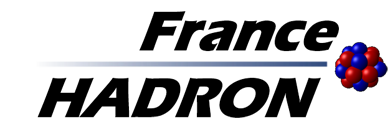Hadrontherapy
Hadrontherapy is an innovative technique to fight cancer. It destroys radioresistant and inoperable cancer-cells by irradiating them with a beam of particles. Conventional radiotherapy uses essentially X-rays, while hadrontherapy uses a hadron beam, including protons (called protontherapy in this case) and carbon ions (known in this case carbonetherapy). In France, protontherapy is already practiced in Orsay protontherapy center (Institut Curie) and Nice (Centre Antoine Lacassagne). Protontherapy treatments will also be available in the future to Toulouse (Institut Claudius Regaud). The Centre ETOILE (Lyon) is a project of national carbonetherapy center. Archade, a technological research center is also planned in Caen. Current experimentations using carbon beams are performed at GANIL.

A proportion of tumors resist to doses that can be delivered by conventional X-ray radiation techniques. This resistance is due to the properties of either the tumor or to the too high sensitivity of normal tissue around.
Hadrontherapy concentrates the radiation doses to the target volume (tumor volume) to obtain a significant destructive effect on cancer cells while having little impact on healthy cells present in the path of the ions.
These therapeutic advantages are related to the ballistic properties of the accelerated ions. During penetration of a particle beam in the material, the particles deposit energy on its trajectory. At high speed, the ions have few interactions with the matter (little influence of encountered electrons). However, at low speed, the ions interact strongly and lose all their energy over a short distance. This characteristic is known as the "Bragg peak" allowing healthy tissue to be preserved and tumorous tissues to be destructed.
Energy deposit profiles
Hadrontherapy opens new ways for innovation and improvement of radiotherapy. This requires efforts in research and development. Research within the FranceHADRON infrastructure, multidisciplinary and cooperative, is organized in four thematic, called Working Packages:

WP1 – Clinical research
WP2 – TPS optimization
WP3 – Radiobiology
WP4 - Instrumentation
Events
June-5th 2015: WP4 meeting in Lyon
May-11th 2015 : Steering-commitee meeting in Paris
April-15th 2015: WP1 meeting in Orsay
Module-Workshops and international meeting
May 18-23 2015: 54th PTCOG - Manchester Grand Hyatt, San Diego, California







